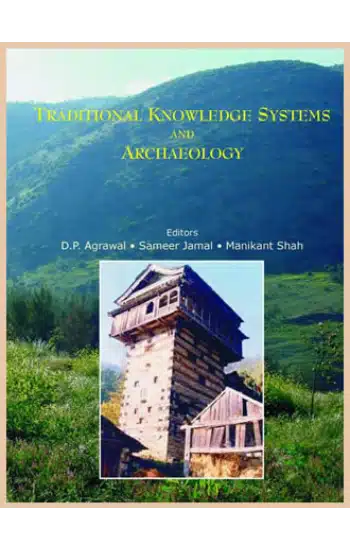
Save: 15%

Save: 15%
TRADITIONAL KNOWLEDGE SYSTEMS AND ARCHAEOLOGY
Publisher:
| Author:
| Language:
| Format:
Publisher:
Author:
Language:
Format:
₹1,250 ₹1,063
Save: 15%
In stock
Ships within:
In stock
| Book Type |
|---|
ISBN:
Page Extent:
The Traditional Knowledge Systems (TKS) are the corpus of accumulated folk knowledge gained through trial and error through millennia. This folk knowledge therefore has a parental relationship to the elite science. The micro-variations of the ambient harsh environment of the hills have been responsible for the extremely rich community knowledge systems and a biodiversity necessary for sustainability of human life here. The mountain people also cultivate many lesser known crops and medicinal plants and this biodiversity is of immense value for the future, for genetics, health and breeding. Most of the village people depend upon the Himalayan medicine system rather than on the allopathic medicine. There are a lot of folk medicines used extensively to treat animals. The Naulas (water springs) are marvels of traditional hydraulic technology and still serve the demand of clean potable water. The traditional domestic architecture has enabled people to build quake resistant houses. There is a traditional technology for distilling alcohol for drinking purposes and also for making fermented food and beverages. They also have a developed technology for dyeing wool and cotton using natural dyes. The Kumauni folklore is a veritable treasure of folk knowledge. For an intergrated and sustainable development of the hills it is necessary to use traditional technologies. The TKS also helps to understand archaeological remains of domestic and temple architecture, hydraulic structures and burial remains, even of rock art. Despite the tremendous importance and value of traditional knowlege, especially in the hilly areas such as Uttaranchal, it is at a risk of becoming extinct for various reasons. We do hope that this book will help preserve the traditional knowledge systems of Uttaranchal, as also emphasise their use for sustainable development.
The Traditional Knowledge Systems (TKS) are the corpus of accumulated folk knowledge gained through trial and error through millennia. This folk knowledge therefore has a parental relationship to the elite science. The micro-variations of the ambient harsh environment of the hills have been responsible for the extremely rich community knowledge systems and a biodiversity necessary for sustainability of human life here. The mountain people also cultivate many lesser known crops and medicinal plants and this biodiversity is of immense value for the future, for genetics, health and breeding. Most of the village people depend upon the Himalayan medicine system rather than on the allopathic medicine. There are a lot of folk medicines used extensively to treat animals. The Naulas (water springs) are marvels of traditional hydraulic technology and still serve the demand of clean potable water. The traditional domestic architecture has enabled people to build quake resistant houses. There is a traditional technology for distilling alcohol for drinking purposes and also for making fermented food and beverages. They also have a developed technology for dyeing wool and cotton using natural dyes. The Kumauni folklore is a veritable treasure of folk knowledge. For an intergrated and sustainable development of the hills it is necessary to use traditional technologies. The TKS also helps to understand archaeological remains of domestic and temple architecture, hydraulic structures and burial remains, even of rock art. Despite the tremendous importance and value of traditional knowlege, especially in the hilly areas such as Uttaranchal, it is at a risk of becoming extinct for various reasons. We do hope that this book will help preserve the traditional knowledge systems of Uttaranchal, as also emphasise their use for sustainable development.
About Author
Reviews
There are no reviews yet.
Related products
HERITAGE OF RAJASTHAN: Monuments and Archaeological Sites
Save: 15%
DIALOGUE OF CIVILIZATIONS: William Jones and the Orientalists
Save: 15%
HINDU AND BUDDHIST MONUMENTS AND REMAINS IN SOUTHEAST ASIA
Save: 15%
RAJASTHAN : Prehistoric and Early Historic Foundations
Save: 15%
RELATED PRODUCTS
BEYOND POTS AND PANS: A Study on Chalcolithic Balathal
Save: 15%
Burhanpur: Unexplored History, Monuments And Society
Save: 15%
DIALOGUE OF CIVILIZATIONS: William Jones and the Orientalists
Save: 15%
Early History Of Varanasi: Recent Excavations At Rajghat
Save: 15%
EIGHTEEN FIFTY SEVEN : Revolt and Contemporary Visuals
Save: 15%
Harappan Studies: Recent Researches In South Asian Archaeology (Vol. Ii)
Save: 15%
HERITAGE OF RAJASTHAN: Monuments and Archaeological Sites
Save: 15%
RAJASTHAN : Prehistoric and Early Historic Foundations
Save: 15%
The Sacred Landscape Of Mundeshwari: The ‘Oldest Living’ Temple
Save: 15%
THE ARCHAEOLOGY OF MIDDLE GANGA PLAIN: Excavations at Agiabir
Save: 15%
THE INDUS CIVILIZATION: An Interdisciplinary Perspective
Save: 15%



Reviews
There are no reviews yet.